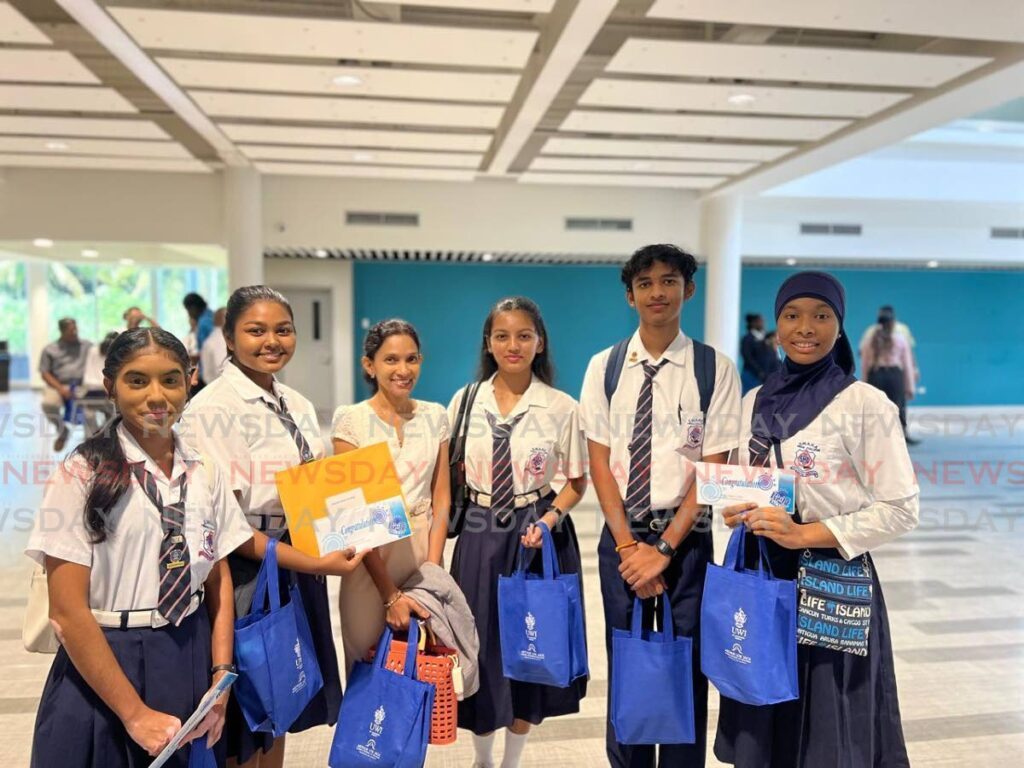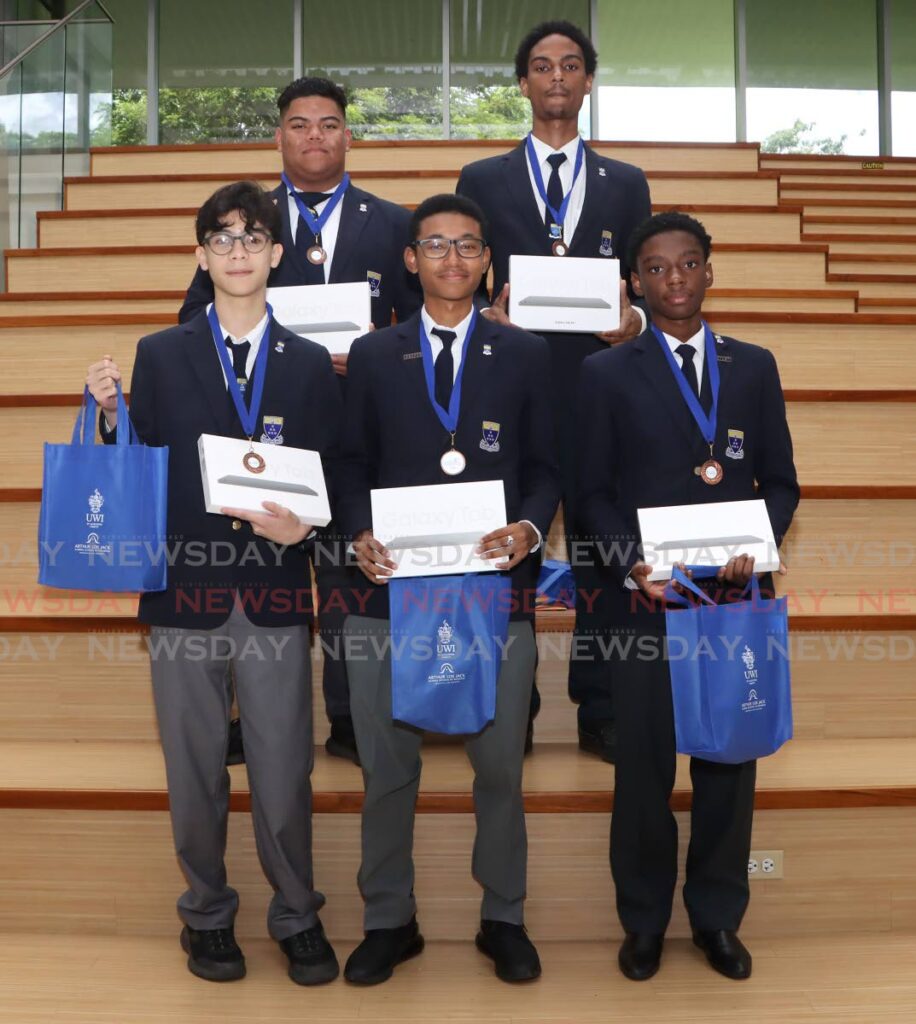Business students shine in virtual competition

Putting in the time, effort and teamwork needed to manage a business is no small task. This is something secondary-school students learned firsthand as they participated in the Arthur Lok Jack Global School of Business’s Secondary School Business Simulation Competition.
Running from October 4-November 6, the competition challenged participating students to manage a virtual business as they competed with each other from the top places.
Business Day spoke to the second, third and fourth-place winners at the award ceremony on November 15.
SWAHA Hindu College cops fourth place
For SWAHA Hindu College, the competition was a first. So, having placed fourth overall out of 35 schools, participating student Kimberly Mohammed expressed pride in her team’s performance.
"We believe we did it really well. It was something very new to us, and you know you wouldn’t see this in a textbook. You wouldn’t see this in the POB (principles of business) or MOB (management of business) textbook. It was like it was real life, and for us to have made it so far, first of all, we have to thank God."
For her and her team, the competition was not an easy one, as they were tasked with managing many of the real-life aspects of a business, including profits and sustainability.

"It was a challenging, complex competition, and I liked that about it. It wasn’t a simple thing. We were anxious to see results, wondering if our decisions made sense, if we focused on sustainability enough and if our profits were enough."
Her teammate Rahul Ramdeo had similar views as he spoke about the technical challenges of the competition.
"The interface at first was really confusing. There were a lot of numbers and a lot of metrics that we were not aware of. Yes, we did economics and POB – but it was very different in the simulation itself."
The group credited its success to teamwork and learning from past mistakes.
"We really worked through it. The first round was the test round, and we really worked and got through it," Ramdeo said. "The team effort really and truly helped. Everybody put in their input somewhere and we understood better through collaborative effort."
Mohammed said her biggest takeaway from the competition was learning how to adapt to the endless changes of the business world.
"Being able to adapt to anything that hit us, being able to adapt to negative profits when we didn’t expect to get negative profits – and that’s really important about this competition. Because in the business world everything changes, nothing is ever static, and that is something that I think we as business students should be aware of.
"You will never win everything. You can’t have it all. But you have to be able to pick yourself up even when you fall...in business and entrepreneurship."
Fatima College wins third place
No strangers to the competition, Fatima College placed third for the second consecutive year.
With its practical approach to business education, participating student Sterlin Russell said the simulation was better suited to his learning style than standard classroom lessons.
"I am more of a hands-on learner, so doing this competition really got me a sense of what you have to do in a real business scenario. I feel like CAPE attempts to do this with case studies but it’s not really as practical, since you have to be writing an exam."

His teammate Matthew Renwick said the simulation sharpened his sense of competitiveness in the context of business management.
"It really showed us the importance of foresight. One of the things in business is that you always have to be aware of your competitors and what they've done. So you’d always get, for example, financial reports. You get to see the public limited companies, all their financials for the year, and you compare that and make decisions for this year.
"But another thing we had to consider for this competition was what they do next year as well. So it’s not just adapting to what they’ve already done, but also anticipating what they might do and then implementing strategies to meet that expected performance in the next year as well."
Renwick said the practicality of the competition will benefit him in his future business pursuits.
"I am a pure business student – I do management of business, accounting and entrepreneurship. So this was really a good experience for me personally, because as an entrepreneur you will have to – like we did – run your own business and make decisions to grow in the future.
"This competition would’ve introduced variables like sustainability, which was a very important factor in the competition and in business now, because global warming is becoming an increasingly important thing and is happening worldwide. So this competition would have given us the first steps to see what that’s like and make your own decisions."
Naparima College takes second place
Naparima College also trod on familiar territory, placing second in this year’s competition after winning cycle one in April 2023.
This year’s team expressed satisfaction at the end of the competition as they reflected on the fun challenges the simulation brought them.
Josiah Rajack said, "Overall, it was a fantastic experience. It was a real learning experience transitioning from the classroom setting to online simulations. We were able to apply what we learned from the classroom to the simulation, and I think it was a real eye-opener. You’re accustomed to just learning on the board, and now you get to actually apply it and see how it works, so it was a great experience.
Mathieu Beharry said, "It was a really fun experience. I did CSEC POA, and it was fun to see how it actually came to life and it was interesting to see how much new stuff was also added to show how a business actually runs.
"For example, the ESG (environmental, social and governance) reputation for our business: it was fun to see how the sustainability reputation for your business actually affected how profitable your business was."
Rajack said understanding the sustainability component proved to be a challenge that, when overcome, paved the pathway for the success of their business.
"At first it was kinda difficult to grasp the concept of it, but eventually, over time, you realise that the higher your ESG, is the more profitable your business could be – and once we grasped that concept, it becomes a lot easier for the whole team to make better decisions. Not just sales-wise, but (the) overall sustainability of the business."
Like the other groups, Rajack said teamwork was one of the key contributors to his school's second-place win.
"I think from the get-go we, as a team, really gelled. The chemistry was always there, so it wasn’t just one person saying, ‘You have to do this and that,’ it was everyone putting in their opinions, and I think that allowed us to make the best decisions possible.
"So even if one round we went with somebody’s decision, the next round we went with somebody else's, so everybody still gave their input. Like I said, in the beginning, it was a bit challenging but as the competition progressed we got better and better."

Comments
"Business students shine in virtual competition"